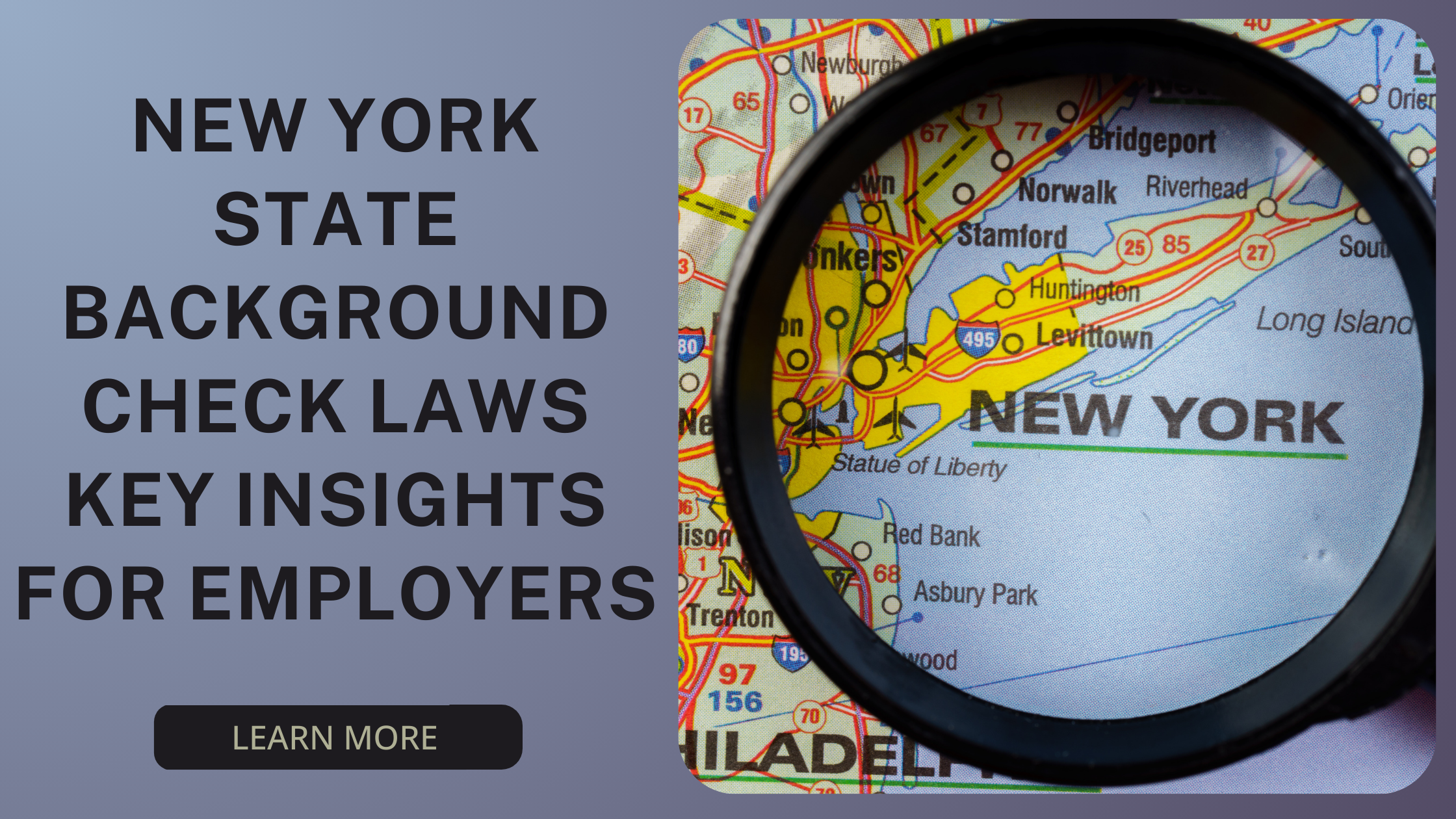New York State Background Check Regulations: Essential Insights for Employers
Background checks are an essential part of the hiring process, serving as a tool for employers to ensure they are making informed decisions about potential employees. In New York State, as in many other areas, conducting thorough background checks is critical to mitigating risks such as fraud, workplace violence, and legal issues. However, with great power comes great responsibility—employers in New York must be aware of state-specific regulations that govern the use of background checks. These rules are designed to protect individuals’ rights while also ensuring that employers have the information they need to make secure and compliant hiring decisions.
In New York State, background checks must comply with a set of established laws that regulate how, when, and why they can be performed. These regulations are meant to safeguard against discrimination and ensure that background checks are used appropriately and fairly. Understanding these rules is crucial for employers seeking to protect both their business and their potential employees from legal complications.
Overview of New York State Background Check Regulations
Several important laws govern background checks in New York, all designed to protect applicants from discrimination and ensure fairness throughout the hiring process.
- The Fair Chance Act (Ban the Box): One of the most notable pieces of legislation in New York State regarding background checks is the Fair Chance Act, which restricts the timing of background checks in the hiring process. Under this law, employers are prohibited from asking about an applicant’s criminal history on the job application itself—hence the term “Ban the Box.” Employers can only inquire about criminal history after a conditional job offer has been extended. This ensures that applicants are considered based on their qualifications before being judged on their past criminal activity.
- Credit Check Restrictions: New York also has laws that limit when employers can conduct credit checks on prospective employees. Employers in most sectors are prohibited from using credit reports as a determining factor in hiring decisions, except for specific job roles such as those in banking, finance, and certain management positions. This restriction is intended to prevent discrimination against individuals with poor credit history, especially those who may have faced financial hardship due to factors beyond their control.
- Consumer Protection and Privacy Laws: Employers in New York must adhere to strict consumer protection and privacy laws when conducting background checks. This includes providing applicants with clear notice when a background check is being conducted and obtaining written consent from the applicant prior to running the check. Additionally, if a background check results in an adverse action (e.g., a decision not to hire the applicant), the employer must follow specific procedures to notify the applicant and provide them with a chance to dispute the findings.
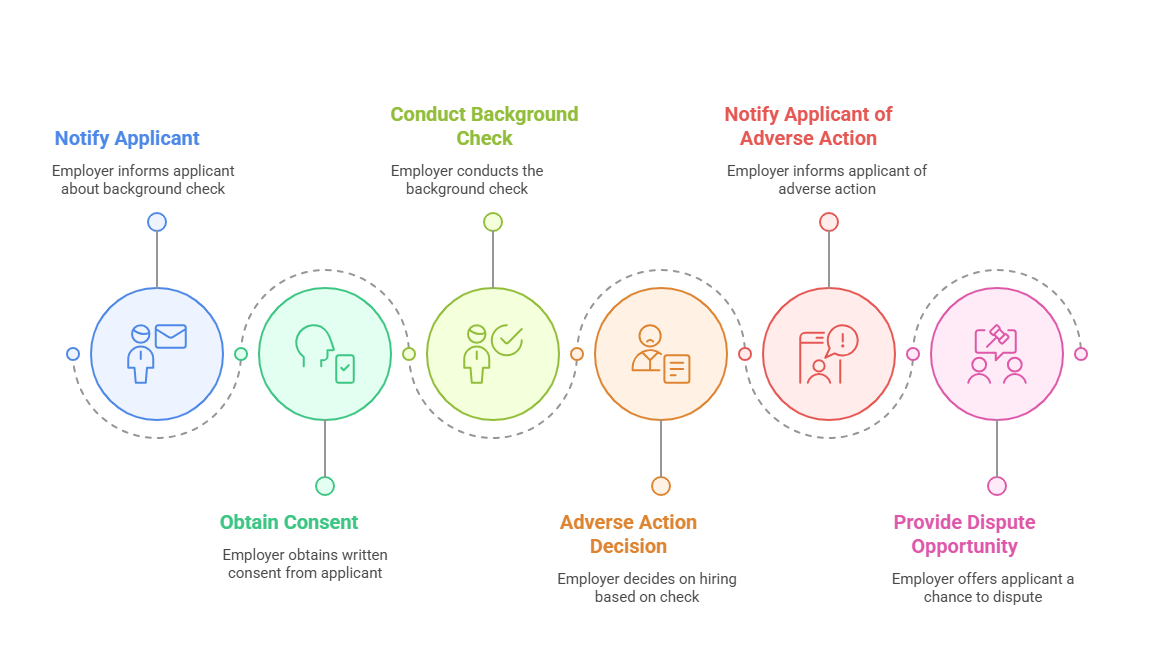
- Equal Employment Opportunity (EEO) Compliance: Employers must also comply with federal Equal Employment Opportunity (EEO) laws that prevent discrimination based on race, color, national origin, sex, disability, or religion. This includes ensuring that background checks are conducted in a non-discriminatory manner. The use of criminal background checks, for example, must not disproportionately affect certain racial or ethnic groups.
These regulations aim to create a fairer and more equitable hiring process by ensuring that applicants are not unfairly judged based on their past history but are instead assessed based on their qualifications for the position at hand.
Types of Background Checks in New York
In New York, employers can conduct various types of background checks depending on the nature of the job and the needs of the business. The most common types of background checks include:
- Criminal Background Checks: This is perhaps the most widely used background check and involves examining an applicant’s criminal history, which includes any past convictions, pending charges, and arrests. In New York, criminal background checks are governed by specific laws, such as the Fair Chance Act, which restricts when and how these checks can be used during the hiring process.
- Employment History Verification: This type of background check confirms an applicant’s employment history, including job titles, dates of employment, and reasons for leaving previous positions. This is essential for ensuring that an applicant has the experience they claim and can perform the job responsibilities as outlined.
- Education Verification: Employers often verify the educational qualifications of applicants to ensure they have the degrees or certifications they claim. This is particularly important for positions requiring specialized skills or higher education.
- Credit Checks: In New York, credit checks are limited to specific job roles, such as those involving financial responsibilities. Employers must obtain written consent from the applicant before conducting a credit check, and the applicant must be notified if the decision to hire is based on the results of the credit check.
- Drug Testing: Employers may also require drug testing as part of the background check process, particularly for safety-sensitive jobs or those in certain industries, such as transportation and healthcare. New York has laws that regulate the use of drug testing, ensuring that it is done fairly and consistently.
Why Employers Must Comply with New York’s Regulations
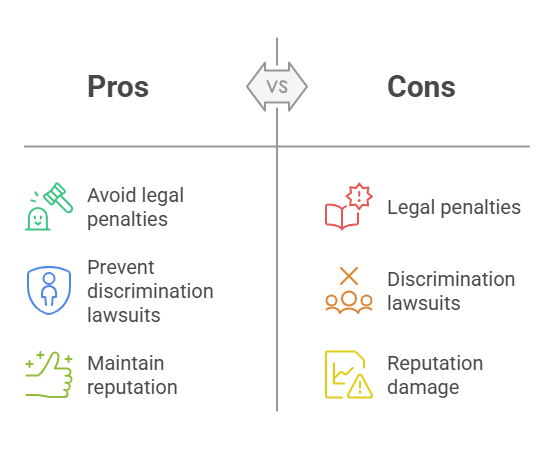
Failure to comply with New York State’s background check regulations can result in significant risks for employers. Non-compliance can lead to legal penalties, including fines and lawsuits. In some cases, employers may also face discrimination lawsuits if background checks are used improperly or in a discriminatory manner.
- Legal Penalties: Employers who violate the Fair Chance Act or fail to follow the correct procedures for conducting background checks may face penalties, including fines and potential lawsuits from applicants. Additionally, employers may be required to reinstate applicants or offer them positions if the hiring decision was made based on a violation of the law.
- Discrimination Lawsuits: Employers who use background checks in a way that disproportionately affects certain protected groups—such as racial minorities—could be at risk of discrimination lawsuits. It’s essential for employers to ensure that background checks are used fairly and that the information gathered is not used to unfairly disadvantage certain individuals.
- Reputation Damage: In today’s competitive job market, a company’s reputation is crucial. If an employer is found to be in violation of New York State’s background check regulations, it can damage their reputation with potential employees and customers, leading to a loss of trust and business.
Table: Key New York State Background Check Regulations
| Regulation | Description | Compliance Steps for Employers |
|---|---|---|
| Fair Chance Act (Ban the Box) | Employers cannot inquire about criminal history on job applications. | Wait until after a conditional job offer before asking about criminal history. |
| Credit Check Restrictions | Credit checks are prohibited for most roles, with exceptions. | Only conduct credit checks for jobs where credit history is relevant. |
| Privacy Protection Laws | Applicants must be notified and consent to background checks. | Obtain written consent before conducting any background checks. |
| EEOC Compliance | Background checks must be non-discriminatory. | Ensure that background checks do not disproportionately affect certain protected groups. |
New York State Background Check Regulations & RapidHireSolutions Comparison: Key Insights for Employers
Employers in New York State must navigate a complex landscape of background check regulations to ensure compliance. In this section, we will compare RapidHireSolutions with other background check service providers, focusing on key factors that impact employers seeking efficient and compliant background checks for their hiring process.

Pros & Cons Comparison Table
| Key Factor | RapidHireSolutions ✅ | Competitors ❌ |
|---|---|---|
| Compliance with New York Laws | Fully compliant with New York’s Fair Chance Act and other regulations. | May not fully comply with all state-specific regulations. |
| Turnaround Time | Results delivered in 24 hours. | Typically take 15–20 days or longer to complete checks. |
| Accuracy | High accuracy in background verification, reducing the risk of errors. | Accuracy may vary, leading to potential mistakes or delays. |
| Affordability | Competitive pricing with no hidden fees. | Pricing may be higher or less transparent. |
| Customer Support | Excellent customer support with 24/7 availability. | Limited customer service hours or support availability. |
Overview of RapidHireSolutions Services
RapidHireSolutions provides a comprehensive and efficient background check service tailored to meet the specific regulations in New York State. Our platform is designed to ensure compliance with local laws such as the Fair Chance Act, which prohibits asking about criminal history on job applications. Additionally, we adhere to the guidelines surrounding credit check restrictions and provide employers with timely and accurate results.
RapidHireSolutions helps employers in New York navigate the complex background check process by offering services such as criminal history checks, employment and education verification, credit checks (where permissible), and drug testing. Our platform ensures that employers receive results quickly, typically within 24 hours, which is crucial in today’s fast-paced hiring environment.
By working with RapidHireSolutions, employers are assured that they are conducting compliant, accurate, and thorough background checks, thus reducing the risk of legal complications and improving their overall hiring processes.
Turnaround Time Comparison Table
| Service Provider | Turnaround Time |
|---|---|
| RapidHireSolutions | 24 hours |
| Competitors | 15–20 days or more |
RapidHireSolutions stands out in the industry by offering an exceptional turnaround time of just 24 hours for most background checks. This is a stark contrast to many competitors, who can take 15 to 20 days—or even longer—to provide the same level of service. The fast turnaround time allows employers in New York to make hiring decisions quickly and without unnecessary delays, keeping their recruitment processes efficient and their businesses competitive.
Analysis: Why RapidHireSolutions Provides a Competitive Advantage
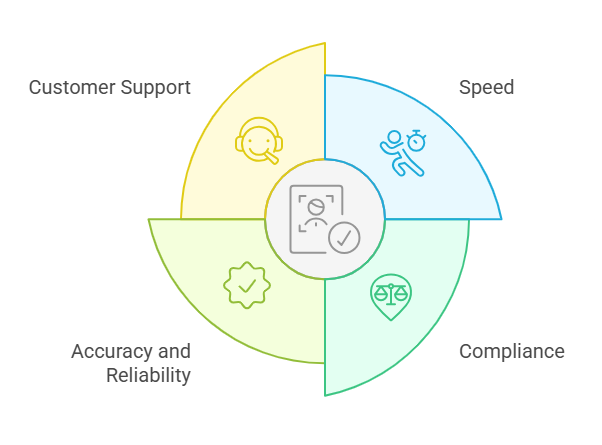
Employers in New York State are under increasing pressure to comply with state-specific regulations while also ensuring they make timely and accurate hiring decisions. The regulations surrounding background checks in New York can be complex, and it is critical for employers to use a service provider that understands the nuances of these laws. RapidHireSolutions provides several key advantages for employers in this context:
- Speed: The 24-hour turnaround time offered by RapidHireSolutions means that employers do not have to wait for weeks to receive the results of a background check. This speed enables businesses to maintain a competitive edge in the labor market by quickly extending offers to top candidates.
- Compliance: RapidHireSolutions ensures full compliance with New York’s Fair Chance Act, credit check restrictions, and other applicable laws. Employers can rest easy knowing that they are adhering to the strict legal requirements of New York State, thus reducing the risk of legal penalties or discrimination lawsuits.
- Accuracy and Reliability: Inaccurate background checks can lead to costly mistakes in the hiring process. With RapidHireSolutions, employers receive highly accurate reports, which helps to avoid the risks associated with incorrect data. Employers can trust the information they receive and make informed decisions with confidence.
- Customer Support: With exceptional customer support available 24/7, employers can easily get help with any questions or concerns regarding background checks. RapidHireSolutions provides excellent service to ensure that employers can efficiently navigate the background check process.
Pros & Cons Section
4 Pros for RapidHireSolutions (✅)
- Fully Compliant with New York Regulations: RapidHireSolutions ensures compliance with New York’s Fair Chance Act and other state-specific laws, allowing employers to avoid legal pitfalls.
- Fast Turnaround Time: Background checks are typically completed in just 24 hours, compared to competitors that take weeks. This speed helps employers make quick decisions.
- Accurate Results: RapidHireSolutions provides highly accurate background verification services, reducing the chances of errors or incomplete data that could affect hiring decisions.
- Comprehensive Services: We offer a wide range of background check services, including criminal background checks, employment verification, credit history checks (where applicable), and more.
4 Cons for Competitors (❌)
- Longer Turnaround Time: Many competitors take 15–20 days to provide background check results, which delays hiring decisions and may cause businesses to lose top candidates to competitors who move faster.
- Inconsistent Compliance: Some background check providers may not fully comply with New York’s strict regulations, risking legal issues for employers.
- Lower Accuracy: Some competitors may provide inaccurate or incomplete background information, leading to potential hiring mistakes.
- Limited Customer Support: Competitors may not offer 24/7 customer support, leaving employers with limited access to assistance during critical hiring periods.
Additional Insights: Why Timeliness, Accuracy, and Compliance Matter in New York
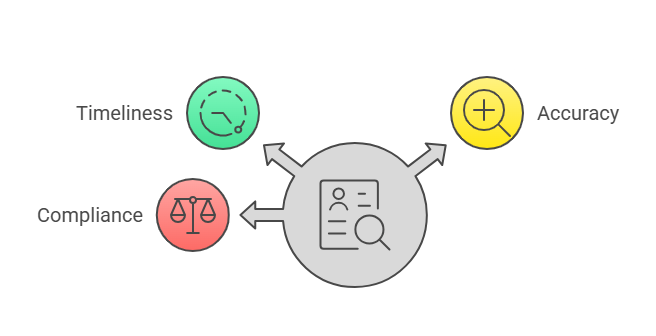
For employers in New York, the background check process is fraught with legal considerations, particularly concerning the timing of criminal background checks and credit checks. Ensuring that your background check provider is fully compliant with state laws is not just important—it’s essential for avoiding potential lawsuits, fines, or damage to your company’s reputation.
- Timeliness: The speed of the hiring process is crucial in a competitive job market. Employers who use background check providers with faster turnaround times can make quicker hiring decisions, which helps to secure top talent before they are snapped up by competitors.
- Accuracy: An inaccurate background check could lead to hiring someone who is not fit for the job or overlooking a qualified candidate. Inaccurate checks can also expose businesses to potential legal liabilities, making it vital to work with a provider that delivers reliable and precise results.
- Compliance: New York State has some of the most robust background check laws in the country. Failing to comply with these regulations can result in fines, lawsuits, and damage to an employer’s reputation. Choosing a provider like RapidHireSolutions, which is well-versed in state-specific regulations, ensures compliance and minimizes legal risks.
Legal Aspects of Background Checks in New York
New York State has a series of regulations governing background checks in the hiring process to protect both employees and employers. It is essential for businesses to understand and follow these laws to ensure compliance and avoid legal pitfalls.
New York’s Fair Chance Act
The Fair Chance Act (FCA), also known as “ban the box,” prohibits employers from inquiring about a candidate’s criminal history during the initial application process. The goal of this law is to give individuals with criminal records a fair chance at securing employment. Employers are required to wait until after a conditional offer of employment is made before conducting a criminal background check.
The law applies to most employers with four or more employees, and it ensures that criminal history is not a barrier during the early stages of hiring. However, employers are allowed to conduct background checks at a later stage, provided they follow the guidelines outlined in the FCA.
Ban the Box and Other Anti-Discrimination Laws
New York’s “Ban the Box” law prohibits the use of a job application question that asks about an applicant’s criminal record. This regulation helps prevent discrimination based on a candidate’s past while promoting fair employment practices. In addition to the Fair Chance Act, the state also adheres to the Equal Employment Opportunity Commission (EEOC) guidelines, which prevent discrimination in employment practices on the basis of race, gender, national origin, and disability.
New York also has strict guidelines for the use of credit reports in employment decisions. Under New York law, employers are restricted from using an applicant’s credit report unless it is directly related to the job in question, such as for positions in financial institutions or those with access to sensitive financial information.

EEOC Compliance and State-Specific Rules
Employers in New York must ensure that they follow both federal and state-specific background check regulations. For example, the Equal Employment Opportunity Commission (EEOC) requires that background checks are not used to discriminate against applicants based on race, color, national origin, sex, disability, or religion. Additionally, state laws must be adhered to for compliance with the Fair Chance Act, Ban the Box, and other anti-discrimination regulations.
Employers must also ensure they provide candidates with notice of the background check, obtain written consent, and allow the candidate an opportunity to dispute any inaccurate information before making a final decision based on the background check results.
FAQ Section
Can employers in New York ask about criminal history during the interview process?
No. Employers must wait until after a conditional offer of employment has been made before conducting a criminal background check under the Fair Chance Act.
Can a background check include credit history in New York?
Employers in New York are only permitted to use an applicant's credit history if the job is related to financial matters or the handling of sensitive information.
What happens if a background check reveals a criminal record?
Under New York’s Fair Chance Act, employers must consider the nature of the offense, its relation to the job, and the time that has passed since the conviction. Employers cannot automatically disqualify candidates based on criminal history.
Are there any exceptions to the Ban the Box law?
Yes, there are some exceptions, such as positions that require a criminal background check by law, including certain government jobs or jobs in law enforcement.
What can happen if an employer violates New York’s background check regulations?
Violating these regulations can lead to legal penalties, fines, and potential lawsuits. Employers may also face discrimination claims if they do not follow the rules outlined in the Fair Chance Act and other laws.
Conclusion
In conclusion, New York State has strict regulations regarding background checks that aim to promote fair employment practices and prevent discrimination. Employers must navigate these rules carefully to ensure compliance with the Fair Chance Act, Ban the Box regulations, and EEOC guidelines.
Choosing a service provider like RapidHireSolutions is essential for employers in New York who need to stay compliant, efficient, and accurate when conducting background checks. With RapidHireSolutions’ expertise and commitment to legal compliance, employers can streamline their hiring process while minimizing legal risks.

